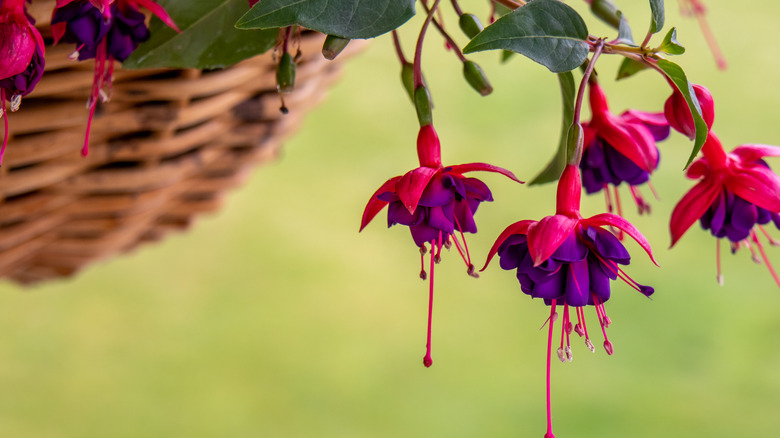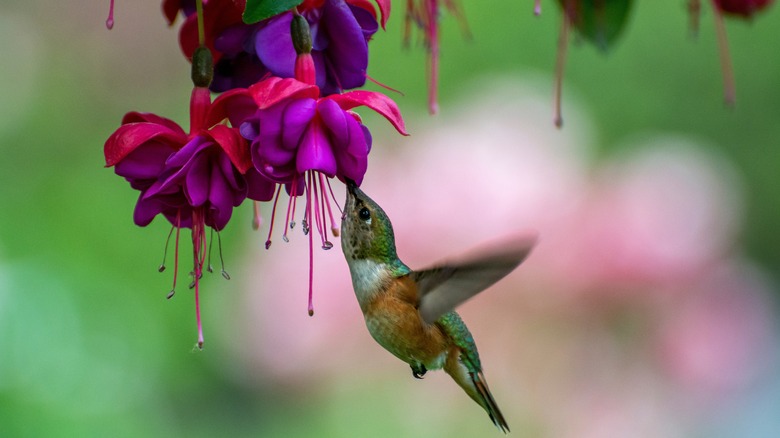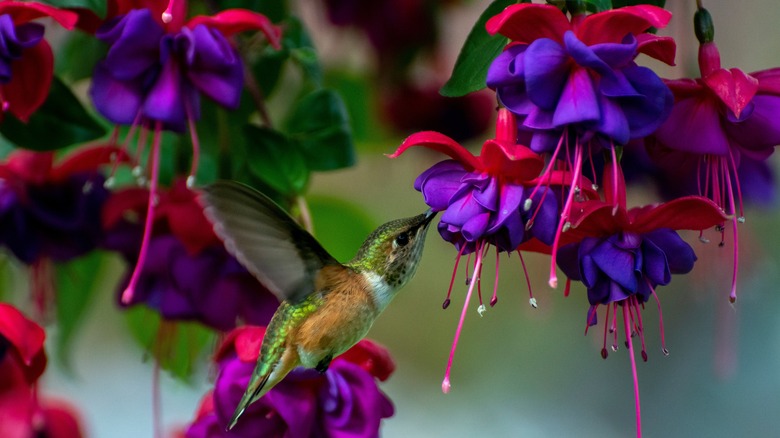Fuchsia Dark Eyes & Hanging Baskets Are A Match Made In Hummingbird Heaven
If you want to start a pollinator garden or simply want an outdoor oasis bursting with colors, you can't go wrong with fuchsia plants. Fuchsia 'dark eyes' is a vibrant cultivar with shades of hot pink to red sepals and a saturated purple or purplish blue corolla emerging from the center. The contrast in colors is what gives this stunning variety its nickname, 'dark eyes.' You may take one look at these exotic beauties and think they require a lot of work, but they're typically viewed as low-maintenance plants. Both novice and experienced gardeners appreciate their striking appearance; even better, hummingbirds do too. You can easily grab the attention of your favorite tiny buzzing birds in flight by adding fuchsia 'dark eyes' to a hanging basket.
Fuchsias are fairly easygoing plants that work well in several types of gardens and landscaping plans. While you can add them to beds and borders, hanging containers are one of the best ways to feed and view hummingbirds. When growing in a garden bed, fuchsia 'dark eyes' will reach 18-24 inches tall so you won't get the best view of these adorable visitors. Placing them in baskets gives you more height customization, allowing you to see hummingbird visits more clearly. Additionally, it keeps these fragile animals safe from predators, which is especially important if you have a pet cat or if neighboring cats frequent your yard.
Why hummingbirds love fuchsia 'dark eyes'
Is there anything more enchanting than a vibrant garden with colorful butterflies, bees, and hummingbirds flying around? While all of these pollinators are attracted to nectar-rich flowers, there are a few extra steps you'll need to take to attract hummingbirds to your garden. These tiny birds have long bills and tongues they use to get their food, so they tend to favor tubular flowers. Fuchsia 'dark eyes' are the perfect shape to accommodate their unique beaks, allowing them to slurp up their favorite nectar easily. Additionally, hummingbirds have extremely high metabolisms, so they need to have lots of meals to fuel them with energy. Fuchsias are great for this, as each plant is flooded with gorgeous blossoms, giving our small feathered friends plenty of nectar to go around.
When you think of a hummingbird feeder, you likely imagine a hanging red container with yellow feeding spots. This design wasn't created by accident. Hummingbirds are especially fond of warm colors like yellow, orange, and particularly red. Although these rapid-eaters will enjoy nectar from nearly any type of flower, they're going to be more attracted to vibrant colors. Fuchsia 'dark eyes' are so saturated that they almost don't even look real, making them an ideal choice for anyone looking to bring in more hummingbirds. Even if you have a small backyard or patio, a few hanging baskets overflowing with fuchsia 'dark eyes' are sure to help you create a hummingbird haven.
How to grow fuchsia 'dark eyes' to benefit hummingbirds
Hanging baskets with fuchsia 'dark eyes' are like magnets for hummingbirds, so long as the flowers are healthy and in bloom. Fuchsias don't take much to thrive, but it's important to have the basics down to successfully care for fuchsia plants. You'll want to place hanging baskets in an area that receives partial shade to full sun to ensure the best blooms. As long as it's well-drained, nearly any gardening soil will work for fuchsia 'dark eyes.' Feed your plants weekly with fertilizer to keep them happy and healthy. Additionally, they need plenty of water to grow and thrive. A good watering once per week will suffice in most places, though they may be thirstier in warmer climates or during periods of drought. You can bring them inside to overwinter if you're growing them outside hardiness zones 9-11.
The effort is worth the reward of taking good care of the vibrant fuchsia 'dark eyes,' especially if you want to bring in pollinators. Because hummingbirds aren't picky about eating at certain heights, you can hang your baskets almost anywhere that suits the plant's care requirements (and gives you the best view.) Hummingbirds aren't just fun to watch; they benefit your garden by acting as a natural pest control. Like other birds, they feed on insects, including garden pests like aphids and mosquitos. Because of this, it's important not to use insecticides. Otherwise, a hummingbird may eat a chemical-covered bug and get sick.


